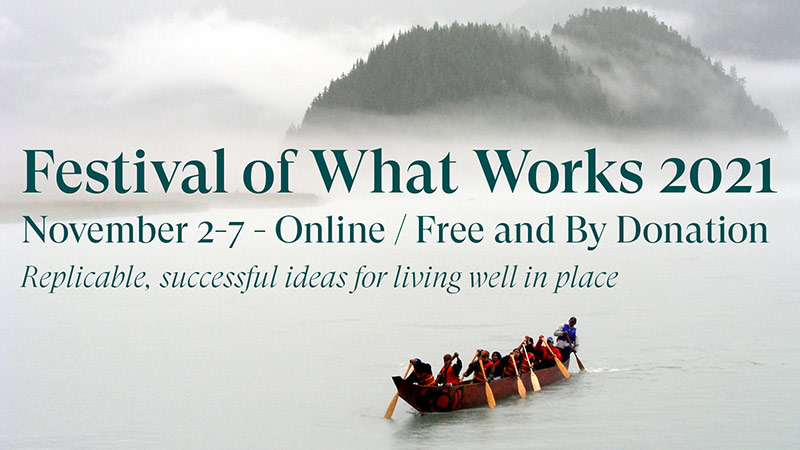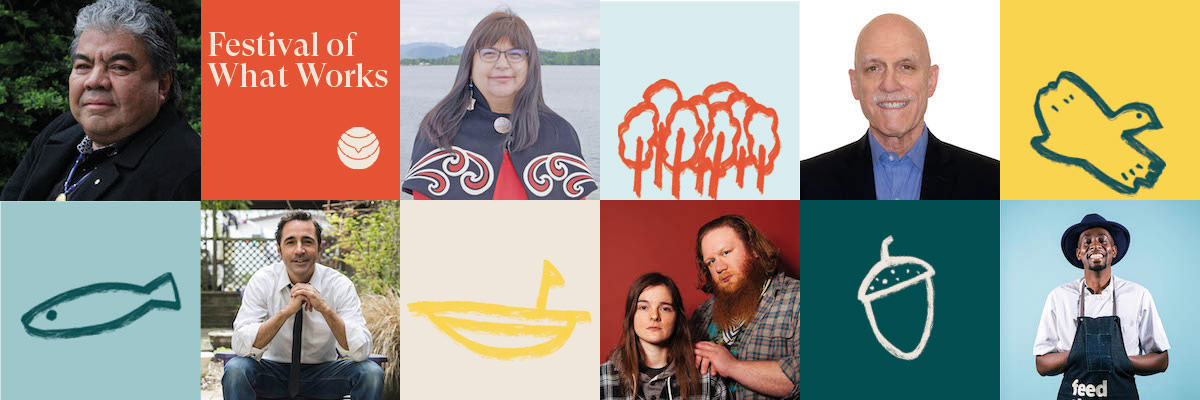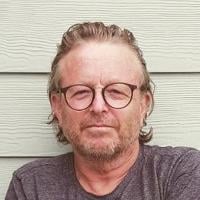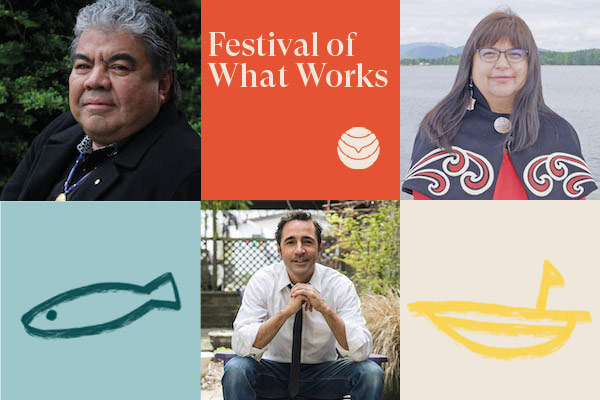Roll up, roll up! It’s that time of the year again.
Oh, but hang on, we’re not exactly out of the woods yet with this darned COVID thing, are we? Travelling around is still tricky, especially across a wide geography. How then do you throw a festival for thousands of people? Well, you do it online of course. So, without leaving the comfort of your home, greetings and welcome to the second annual Salmon Nation Festival of What Works.
Starting Tuesday, Nov. 2, and running through Sunday, Nov. 7, join us for a fascinating journey through Salmon Nation as we break bread and share stories with fascinating people throughout our bioregion. This year’s schedule is jam packed with insights and advice about how to live well in place, right here in this place we call Salmon Nation.
Think of Salmon Nation as a nature state. What we ask of people who are lucky enough to live here is to imagine how we might live and work together in ways that build on community trust, innovation and collaboration, and leave this place better for future generations.
In Salmon Nation, people from northern California to the north slope of Alaska are meeting the challenges of climate change and the COVID-19 pandemic in innovative and positive ways.
At our inaugural online festival last year, we showcased how we can accelerate a vibrant and growing movement towards healthier, localized, more regenerative economies and communities — and have fun doing it! Thousands of people turned up and discovered that our region is a hotbed of creativity and experimentation.
Many people ask themselves how they can create real lasting change in their communities in the face of increasing crises, and our festival revealed that there are myriad ways to engage with each other for lasting and positive outcomes in all walks of life.
Many friendships were forged through the festival. Business alliances were made and carry on to this day. Ideas were freely offered and eagerly received. Well, that’s what we are hoping for this year as well.
The Festival of What Works offers practical, achievable models for how we can support our local communities, whether through better community planning, localized food production, storytelling or advocacy. We focus not on what’s wrong, but on what works. And on ways to replicate good practices through the region.
The festival, which runs Nov. 2-7, is free to attend, although you are welcome to pay what you can to help us meet our costs. You don’t have to register, but we prefer it. It’s easy to do right here. And once you’re in, you can choose between live events or what we call “on-demand” pre-recorded sessions.
Panelists, performers and participants include celebrity chef Annita McPhee; authors Jenny Odell (How To Do Nothing), Andri Snær Magnason (On Time and Water) and Arno Kopecky (The Environmentalist's Dilemma); the electronic music duo Whiskey Class; Indigenous leaders Kilslaay Kaajii Sding Miles Richardson (Haida) and K̓áwáziɫ Marilyn Slett (Haíɫzaqv); storyteller and musician Candace Curr and human rights scholar and advocate Napaġiak Dalee Sambo Dorough... to name just a few.
See the full schedule here.
And check out some highlights below.

EVENT HIGHLIGHTS
Nature-Based Planning in Action
Nature-based solutions are underpinned by natural processes or structures, designed to address environmental challenges while providing multiple benefits to economy, society and our ecological systems. In short: they’re what works. Two exceptional leaders and planners share how we can use nature to inform, plan, design and make decisions — and how, by doing so, we can protect our natural environments.
Herb Hammond, from Silva Forest Foundation, will share the philosophy, principles and process of nature-based planning, and how his development of NBP has been shaped by his work with many Indigenous peoples. Dawn Morrison, from the Working Group on Indigenous Food Sovereignty, will share her analysis, insights and experience on how NBP is complementary to Indigenous Knowledge, laws and governance. She will also share an overview of current work that is using NBP to reassert Indigenous rights to hunt, fish, farm and to protect land and water.
After the Fire: Community Wisdom Following Devastation
In 2018, the town of Paradise, California, and surrounding communities were destroyed by fire. In less than a day, most members of the community lost their homes; some lost their lives. In 2021, close to two million acres of land burned in California alone as the wildfires continued to rage. Members of the Paradise community share what they’ve learned since then. How does an individual — and community — begin to rebuild after such destruction? What are the qualities that support rebuilding? What should other, small communities — especially those affected by wildfires — prepare to support each other? Survivors of California's Camp Fire offer us an invitation to stay curious, live with hope and do it together.
Traditional Tea Time in Lingit Aani
This session will include a demonstration of how to prepare traditional, Indigenous teas, in addition to a discussion about the relationship between Indigenous plant knowledge, storytelling and culture. Trixie Kalkins-Bennett will share more about the powerful stories we learn from plants, and how they can help us to recognize the strength from our Elders and ancestors, including two of her own favourite lessons from Tlingit legends and leaders. Audiences will also learn more about how interconnected the loss of Indigenous land is to loss of food knowledge, and what this means for current and future generations. This skills demonstration is just one of the ways to harness, and share, lessons that would otherwise be lost from communities blighted by colonialism.
Right Relations Collaborative
Last year we had a terrific and popular panel on what needs to change in philanthropy, a subject that is dear to the hearts of changemakers everywhere. This year, 'Cúagilákv Jess Housty (Qqs Projects Society) and Kim Hardy (MakeWay foundation) share insights from the evolving Right Relations Collaborative, a new effort to address white supremacy and power dynamics in conventional philanthropy by inviting Indigenous Aunties to set the terms for values-based relationships. The collaborative includes core funding and key offerings for rural and remote Indigenous communities and organizations; a facilitated space for funders to identify and unlearn harmful philanthropic practices; and a shared space where both come together in right relationship. Join us for a dialogue about the story and values that drive this work and the incredible leaders who are shaping this space.
Indigenous Women in Conservation
Nuskmata Jacinda Mack and Melanie Brown have led conservation efforts across Salmon Nation. They discuss the importance of mentorship and friendship, inter-community dialogue, trust and collaborative actions in their work. They will share their experiences of navigating conservation spaces as Indigenous women within projects they work on, ranging from food and water security, citizen science, direct action and activism, and Indigenous land guardianship.
And after all that and more, why not spend an hour learning how to do this:
How to Do Nothing
Sharing the ideas from her transformational book, How to Do Nothing, artist Jenny Odell offers a glimpse at the path of the refusenik — and a way of deep relationship with place as a way to move against capitalism and other major cultural forces that extract from us. Odell’s book is perhaps one of the most beloved in recent times — thrust into the hands of colleagues, friends and loved ones in need of a new paradigm for self-worth and time. More than 150,000 copies were produced in the first print run alone, and Time, the New Yorker, NPR and more named it as a Best Book of the Year. It’s a thrilling critique of our obsession with productivity — and an action plan for thinking outside of capitalist narratives of efficiency and techno-determinism. This is a must-read and a must-see for our harried times.

PLEASE JOIN US!
From learning how to do nothing, to discovering how to make a difference in Salmon Nation, the 2021 edition of the Festival of What Works has, we hope, something for everyone. We don’t claim to know everything that’s happening in our bioregion, but we’re thrilled to continue the conversation — a “storytelling,” if you will — with remarkable people doing remarkable things to make our communities stronger.
We invite everyone in the bioregion to participate in keeping our corner of the world as big and wild and welcoming and remarkable as we know it to be. All we need from you is an open mind, a dash of curiosity and best of all, a good story. ![]()
Read more: Indigenous, Food, Environment
This article is part of a Tyee Presents initiative. Tyee Presents is the special sponsored content section within The Tyee where we highlight contests, events and other initiatives that are either put on by us or by our select partners. The Tyee does not and cannot vouch for or endorse products advertised on The Tyee. We choose our partners carefully and consciously, to fit with The Tyee’s reputation as B.C.’s Home for News, Culture and Solutions. Learn more about Tyee Presents here.


















Tyee Commenting Guidelines
Comments that violate guidelines risk being deleted, and violations may result in a temporary or permanent user ban. Maintain the spirit of good conversation to stay in the discussion.
*Please note The Tyee is not a forum for spreading misinformation about COVID-19, denying its existence or minimizing its risk to public health.
Do:
Do not: